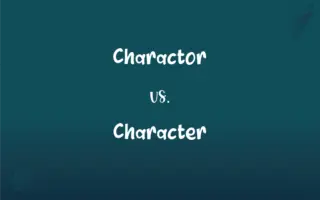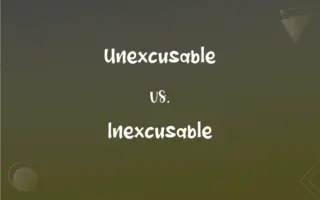Aggree vs. Agree: Mastering the Correct Spelling
Edited by Harlon Moss || By Janet White || Updated on March 13, 2024
"Aggree" is an incorrect spelling; the correct term is "agree," meaning to have the same opinion or accept a proposal or statement.

Which is correct: Aggree or Agree
How to spell Agree?

Aggree is Incorrect

Agree is Correct
ADVERTISEMENT
Key Differences
Common phrases like "I agree" can help reinforce the right spelling.
Always spell-check or review writings to avoid such common mistakes.
Think of "agreement" which also has just one "g".
Agree Definitions:
"Agree" is spelled with one "g" while "aggree" mistakenly has two.
ADVERTISEMENT
Remember the phrase: "We both agree" to recall the single "g" spelling.
Correct usage of Agree
It's hard to aggree on a movie when everyone has different tastes.
It's hard to agree on a movie when everyone has different tastes.
She didn't aggree with the new policy at work.
She didn't agree with the new policy at work.
Do you aggree with the decision made by the committee?
Do you agree with the decision made by the committee?
We couldn't aggree on where to go for dinner.
We couldn't agree on where to go for dinner.
I aggree that we should start the project soon.
I agree that we should start the project soon.
Agree Definitions
"Agree" means to have the same opinion or view.
They both agree on the movie choice.
"Agree" can imply giving consent.
I agree to the terms and conditions.
To share an opinion or feeling; be in accord
I agree with you on that. We agree in our taste in music.
To express consent; concur
We agreed to her suggestion.
To accept or support a policy or program
I agree with the flat tax.
To come to an understanding or agreement, as by negotiating
We agreed on the price.
To be compatible or consistent
The copy agrees with the original. Your story agrees with mine.
To be suitable, appropriate, pleasing, or healthful
Spicy food does not agree with me.
(Grammar) To correspond in gender, number, case, or person.
To share an opinion about (something)
My doctor and I agree that I should quit smoking.
To grant or concede
My parents agreed that we should be allowed to go. I agreed to help my parents clean the house.
(intransitive) To be in harmony about an opinion, statement, or action; to have a consistent idea between two or more people.
All parties agree in the expediency of the law.
I mostly agree with what you said, but I consider your last point to be unfair.
I couldn't agree more with what you say.
To give assent; to accede
To agree to an offer, or to opinion.
The workers didn not agree to the new terms offered by the trade union.
To yield assent to; to approve.
(intransitive) To make a stipulation by way of settling differences or determining a price; to exchange promises; to come to terms or to a common resolve; to promise.
(intransitive) To resemble; to coincide; to correspond.
The picture does not agree with the original; the two scales agree exactly.
To suit or be adapted in its effects; to do well.
The same food does not agree with every constitution.
To correspond to (another word) in a grammatical category, such as gender, number, case, or person.
In Romanian, all articles, adjectives, and pronouns agree in gender, number and case with the noun they refer to.
To consent to a contract or to an element of a contract.
To harmonize in opinion, statement, or action; to be in unison or concord; to be or become united or consistent; to concur; as, all parties agree in the expediency of the law.
If music and sweet poetry agree.
Their witness agreed not together.
The more you agree together, the less hurt can your enemies do you.
To yield assent; to accede; - followed by to; as, to agree to an offer, or to opinion.
To make a stipulation by way of settling differences or determining a price; to exchange promises; to come to terms or to a common resolve; to promise.
Agree with thine adversary quickly.
Didst not thou agree with me for a penny ?
To be conformable; to resemble; to coincide; to correspond; as, the picture does not agree with the original; the two scales agree exactly.
To suit or be adapted in its effects; to do well; as, the same food does not agree with every constitution.
To correspond in gender, number, case, or person.
To make harmonious; to reconcile or make friends.
To admit, or come to one mind concerning; to settle; to arrange; as, to agree the fact; to agree differences.
Be in accord; be in agreement;
We agreed on the terms of the settlement
I can't agree with you!
I hold with those who say life is sacred
Both philosophers concord on this point
Consent or assent to a condition, or agree to do something;
She agreed to all my conditions
He agreed to leave her alone
Be compatible, similar or consistent; coincide in their characteristics;
The two stories don't agree in many details
The handwriting checks with the signature on the check
The suspect's fingerprints don't match those on the gun
Go together;
The colors don't harmonize
Their ideas concorded
Show grammatical agreement;
Subjects and verbs must always agree in English
Be agreeable or suitable;
White wine doesn't agree with me
Achieve harmony of opinion, feeling, or purpose;
No two of my colleagues would agree on whom to elect chairman
It can signify harmony or compatibility.
The colors agree with each other.
"Agree" might mean to accept a proposal or suggestion.
We agree to meet tomorrow.
It also refers to acknowledging truth or validity.
Scientists agree on the research findings.
Agree Sentences
I agree with you; that sounds like the best option.
Let's agree to disagree on this topic.
Can we all agree to meet at eight o'clock?
He didn't agree with the criticism of his work.
It's difficult to agree when we have so little information.
Do you agree that this is the best course of action?
The contract is binding once both parties agree.
To agree or not to agree, that is the question.
Can everyone agree that safety is our top priority?
We need to agree on the terms before proceeding.
We couldn't agree more with the need for change.
I hope we can agree on a solution soon.
Let's aim to agree on the key points by the end of the day.
Agree Idioms & Phrases
Agree to disagree
To accept that there is a difference of opinion and not argue about it further.
After a long discussion, we decided to agree to disagree on the matter.
All agree
When everyone involved is in agreement.
After the presentation, all agreed that the project should proceed.
Agree wholeheartedly
To agree with great enthusiasm and without any reservations.
I agree wholeheartedly with your assessment.
Agree on all counts
To completely agree with everything that has been said.
After reviewing the proposal, I agree on all counts.
Unanimously agree
When a decision or opinion is shared by everyone without exception.
The committee unanimously agreed to adopt the new policy.
Agree in principle
To agree in general terms but not necessarily to all the details.
We agree in principle with the idea, but we need to work out the specifics.
Mutually agree
When two or more parties come to a common agreement.
Both companies mutually agree to the terms of the partnership.
Agree by consensus
To reach an agreement through general agreement without any formal vote.
The team agreed by consensus to prioritize the project.
Freely agree
To agree without any pressure or coercion.
Both parties freely agree to the terms of the agreement.
Tentatively agree
To agree to something provisionally, subject to further confirmation.
We've tentatively agreed on a date, but it might change.
FAQs
What is the verb form of Agree?
The verb form is "agree."
Why is it called Agree?
It's called "agree" derived from Old French "agreer" meaning "to please or satisfy."
What is the root word of Agree?
The root word is the Old French "agreer."
Which vowel is used before Agree?
The vowel "a" is used before "agree."
What is the singular form of Agree?
"Agree" itself is in singular form.
What is the pronunciation of Agree?
It's pronounced /əˈɡriː/.
What is the plural form of Agree?
Verbs don't have plural forms, so there's no plural for "agree."
Which preposition is used with Agree?
"On" (as in agree on something) or "with" (as in agree with someone) are commonly used.
Is Agree an abstract noun?
No.
Which conjunction is used with Agree?
Any conjunction can be used, depending on the sentence structure.
Is Agree a negative or positive word?
Generally neutral, but often seen as positive when there's consensus.
Is Agree an adverb?
No.
Is Agree a collective noun?
No.
How many syllables are in Agree?
Two syllables.
Is the word Agree is imperative?
It can be used in imperative sentences, e.g., "Agree to this!"
Which determiner is used with Agree?
It varies with context, but "this" (as in this agreement) might be used.
What is the third form of Agree?
Agreed.
How is Agree used in a sentence?
"We agree on the decision to move forward."
Is Agree a countable noun?
It's not a noun, so it's not countable.
Is the Agree term a metaphor?
No, but it can be used in metaphorical expressions.
How do we divide Agree into syllables?
A-gree.
What part of speech is Agree?
Verb.
What is the opposite of Agree?
Disagree.
What is the second form of Agree?
Agreed.
Which article is used with Agree?
Articles aren't typically used directly before "agree," but if needed, "the" or "an" can be used depending on context.
Is Agree a noun or adjective?
"Agree" is primarily a verb.
Is Agree a vowel or consonant?
The word "agree" contains both vowels and consonants.
What is a stressed syllable in Agree?
The second syllable "gree" is stressed.
What is another term for Agree?
Concur.
What is the first form of Agree?
Agree.
About Author
Written by
Janet WhiteJanet White has been an esteemed writer and blogger for Difference Wiki. Holding a Master's degree in Science and Medical Journalism from the prestigious Boston University, she has consistently demonstrated her expertise and passion for her field. When she's not immersed in her work, Janet relishes her time exercising, delving into a good book, and cherishing moments with friends and family.
Edited by
Harlon MossHarlon is a seasoned quality moderator and accomplished content writer for Difference Wiki. An alumnus of the prestigious University of California, he earned his degree in Computer Science. Leveraging his academic background, Harlon brings a meticulous and informed perspective to his work, ensuring content accuracy and excellence.






























































